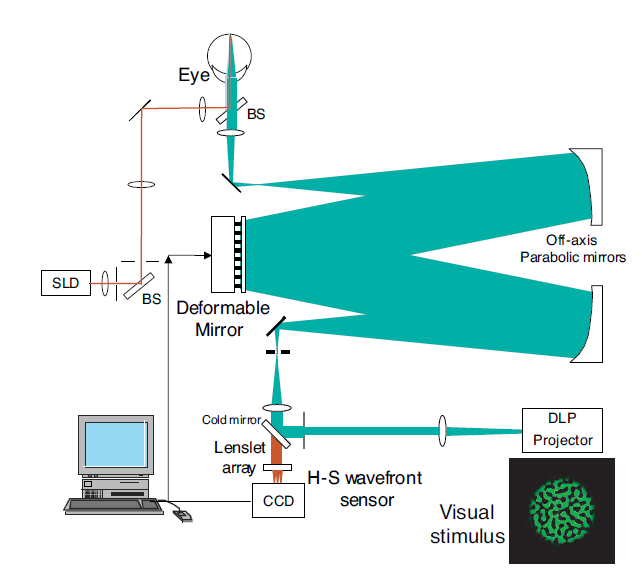A fundamental problem facing sensory systems is to recover useful information about the external world from signals that are corrupted by the sensory process itself. Retinal images in the human eye are affected by optical aberrations that cannot be corrected with ordinary spectacles or contact lenses, and the specific pattern of these aberrations is different in every eye. Though these aberrations always blur the retinal image, our subjective impression is that the visual world is sharp and clear, suggesting that the brain might compensate for their subjective influence. The recent introduction of adaptive optics to control the eye’s aberrations now makes it possible to directly test this idea. If the brain compensates for the eye’s aberrations, vision should be clearest with the eye’s own aberrations rather than with unfamiliar ones. We asked subjects to view a stimulus through an adaptive optics system that either recreated their own aberrations or a rotated version of them. For all five subjects tested, the stimulus seen with the subject’s own aberrations was always sharper than when seen through the rotated version. This supports the hypothesis that the neural visual system is adapted to the eye’s aberrations, thereby removing somehow the effects of blur generated by the sensory apparatus from visual experience. This result could have important implications for methods to correct higher order aberrations with customized refractive surgery because some benefits of optimizing the correction optically might be undone by the nervous system’s compensation for the old aberrations.
Buscar
Categorías
Archivos
- diciembre 2025 (2)
- octubre 2025 (7)
- junio 2025 (2)
- mayo 2025 (1)
- marzo 2025 (4)
- diciembre 2024 (4)
- octubre 2024 (5)
- septiembre 2024 (1)
- julio 2024 (8)
- junio 2024 (1)
- mayo 2024 (1)
- marzo 2024 (1)
- octubre 2023 (2)
- julio 2023 (5)
- junio 2023 (1)
- julio 2022 (10)
- mayo 2022 (1)
- marzo 2022 (1)
- julio 2021 (5)
- marzo 2021 (2)
- octubre 2020 (36)
- septiembre 2020 (122)
- agosto 2020 (10)
- julio 2020 (38)
- abril 2020 (1)
- diciembre 2019 (1)
- abril 2018 (1)
- septiembre 2017 (2)

Neural compensation for the eye’s optical aberrations
- Voptica
- Publicaciones de VAO
Journal:
Journal of Vision
Year:
2004
Link:
Authors:
Pablo Artal, Li Chen, Enrique J. Fernández, Ben Singer, Silvestre Manzanera, David R. Williams